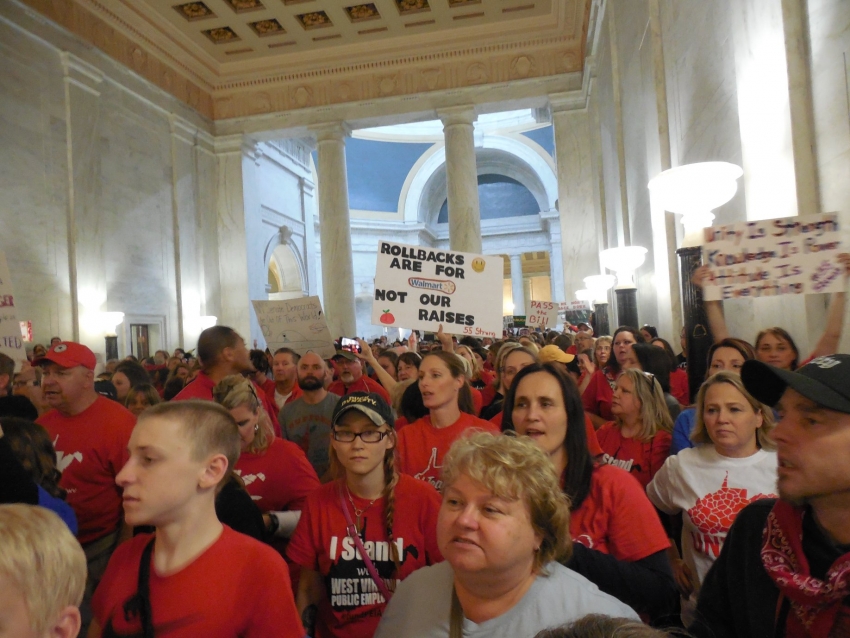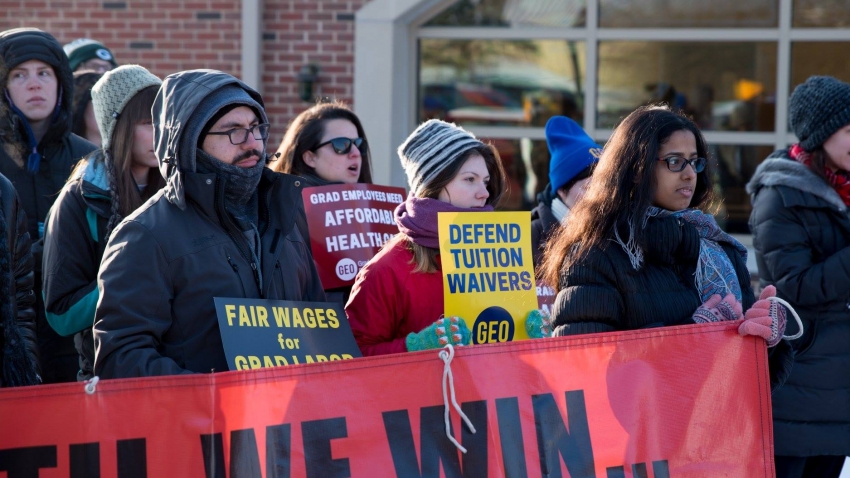
West Virginia teachers, wildcat strikers, on the move
When teachers in West Virginia closed every school in the state for nine days to strike for better wages and better healthcare plans, other educators, and the public around the country, took notice. One of the key issues of the West Virginia teachers was the Public Employee Insurance Agency, or PEIA, and the increasing payments from employees’ paychecks alongside the lack of quality take-home pay for teachers. West Virginian teachers rank 48th in the country in terms of pay, and any raise agreed upon between the West Virginia Education Association and the state would not have been enough to cover the rising PEIA costs.
Instead of caving to the governments’ demands, and suggestions to return to work from the union leaders, West Virginia teachers continued striking two days longer than the union had wanted; when a tentative “agreement” for a five percent raise for teachers and three percent raise for public sector workers was announced by union leaders, the teachers balked, rejecting the agreement and voting to continue the strike, shouting, “We are the union bosses!” and “Back to the table!” The fear would be that the raises would not do anything to fix the more pressing concern of rising healthcare costs, which, teachers argued, would only have short term impact. Chants echoed at the state capitol while the Senate was in session, “Pass that bill or we walk out!” “Hey, hey, whaddya say, fund PEIA!” In the end, instead of a watered down 3-4% raise, the Senate passed a 5% raise and will consider long term action for fixing the state’s public employee healthcare system.
News of the success in the teachers’ strike seems to be emboldening educators in other states. Oklahoma teachers, the lowest paid in the country, are considering a strike, the first major strike since 1990, to demand higher pay from the State Legislature. Teachers in the state are so underpaid that there has been an educator crisis, forcing the state the allow for three day weekends to entice teachers to work in Oklahoma.
On February 26, graduate student workers at the University of Illinois at Urbana-Champaign launched a strike to protect tuition waivers, which the university is planning to roll back by allowing academic departments to exclude students in their program from being members of the Graduate Student Union (GEO) bargaining unit. The strike also aims to making graduate education accessible for all students, demanding comprehensive childcare, healthcare and financial provisions to keep access to graduate level education open to poor and working-class people. The “Education for All” proposal was announced on day four of the strike.
In New Jersey, Jersey City educators have voted to strike, demanding relief from the rising cost of insurance. The union and teachers are demanding a reform of a Christie Era law, signed in 2011, called Chapter 78. The law required teachers to begin paying for their healthcare costs by percentages that increased over a four-year phase-in. Now that the four years are over, the district is permitted to allow teachers to pay a lower contribution than Chapter 78 requires, something the school board does not want to give in on. Any raises from the contract would not cover the cost of the healthcare payments, as one special education teacher pointed out, “I’m making less than I was five years ago.” As of today, the teachers are still working without a contract.
The rising tide of labor, like waking a slumbering giant, is a welcome relief form the ongoing attack on unions across the country, especially during the Trump administration. This time, instead of relying on union bosses, teachers relied on a collective, on each other, and on public support. And they’re winning.

University of Illinois at Urbana – Champaign graduate students, strikers, on the move
(Photo Credit 1: In These Times / West Virginia Education Association / Facebook) (Photo Credit 2: In These Times / GEO / Facebook)

